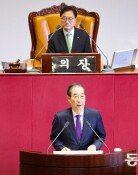[Editorial] NKs Nukes Crash Govts Diplomatic Policies
[Editorial] NKs Nukes Crash Govts Diplomatic Policies
Posted October. 05, 2006 07:12,
A few days before Chuseok, Koreas biggest holiday, North Korea made a shocking announcement that it will test nuclear weapons. Stock prices dropped, and there is concern that it might influence the almost certain election of Foreign Minister Ban Ki-moon as UN Secretary General. The news confirms once again that national cooperation in fact means North Koreas control.
North Koreas nuclear test points to the total collapse of the Sunshine Policy pursued by the Kim Dae-jung and Roh Moo-hyun administrations. As North Korea announced its nuclear test plan after being isolated because of its firing of missiles, the U.S. and Japan are determined not to allow the test, warning that they are considering financial and trade sanctions, blocking sea paths, and even military attack. To follow the spirit of the Sunshine Policy, the government has the burden of supporting North Korea in the state of international isolation.
It is a big mistake if North Korea intends to follow India and Pakistan, members of the Nuclear Club, by announcing it owns nuclear bombs. It will instead trigger endless armament competition in the Northeast Asia region by provoking Japan to pursue a nuclear plan. China is also strongly objecting to North Koreas nuclear arms through its unofficial response: The policy for the Korean peninsula should be readjusted.
A nightmare scenario is the possibility that the U.S. may give tacit approval of North Koreas nuclear arms and adopt a closure policy to stop expansion such as technology transfer, overseas sales, and development of Intercontinental Ballistic Missile. In that case, the goal will be it is OK if nuclear bombs do not reach the U.S. If the scenario becomes true, we should live with North Koreas nuclear threat on the top of our heads and watch Japan increase its armament.
The government whose policy has been focused on self reliance is to blame for the diplomatic failure. It was a mistake to rely on the six-party talks as a solution to all problems. It gave North Korea time to develop nuclear bombs. We are reminded of the historical precedent that England was invaded by Germany when it tried to persuade Hitler to join an international meeting before World War II.
In response to North Koreas nuclear threat, the government said, North Korea is to blame for everything, through a spokesperson of the Ministry of Foreign Affairs and Trade. The ruling party also responded, It should be resolved through talks. We wonder what kind of measures the government has against the North Koreas nuclear test as the Korea-U.S. Operation Plan 5029 was discontinued. Is it going to grab the U.S. governments arm to beg for tolerance?
We are also concerned about the peoples apathy about security issues. More than 80 percent of the people believe there will be no war. It is chilling to consider the possibility that North Korea will make its final choice when it is cornered domestically and internationally. The people should also take responsibility for leaving President Roh with his dangerous view of security: There is a reason in North Koreas argument for nuclear weapons and missiles as a means of self-defense.
Koreas diplomatic policy should be redirected before too late. The first step is to restore cooperation with the U.S. and Japan. It might be too late when North Korea says before long, We will protect our brethren in South Korea with our nuclear weapons.







